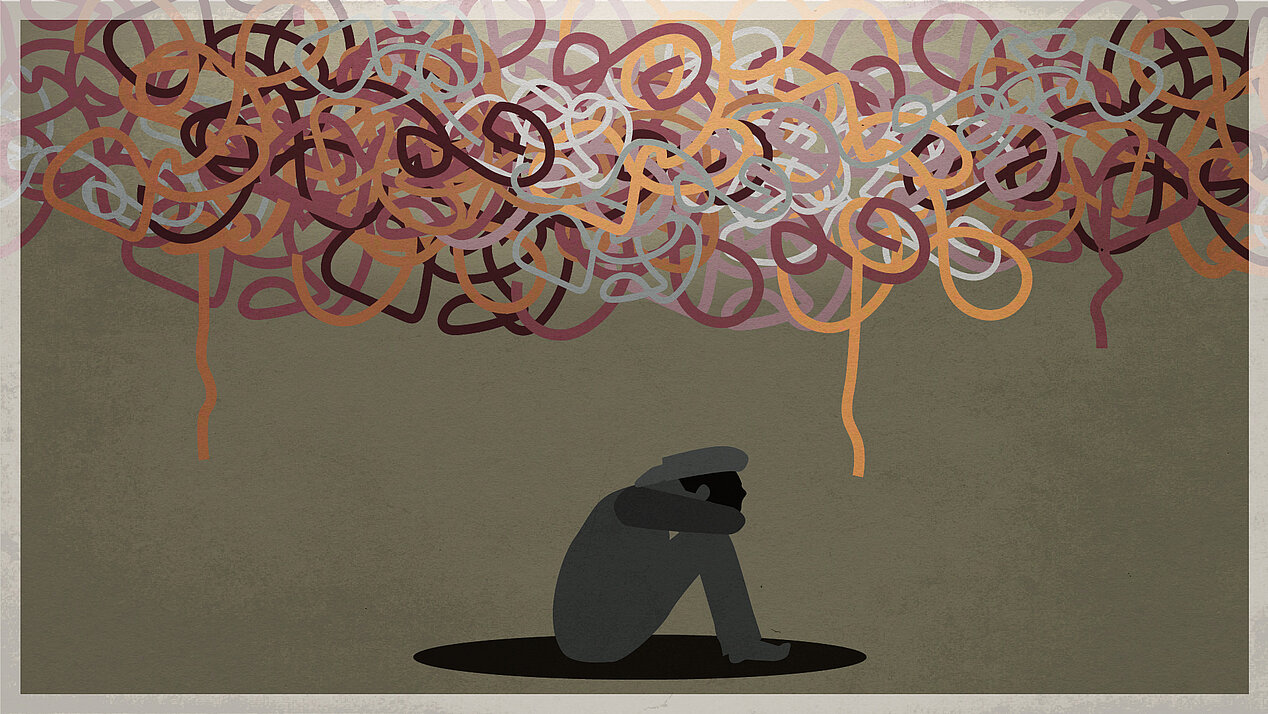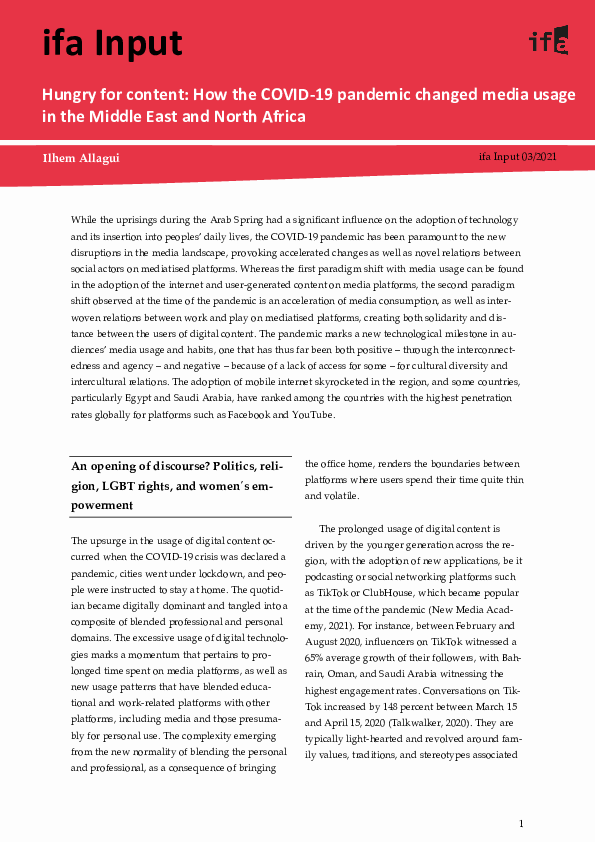ifa: Mr Yendell, Mr Hidalgo, Ms Hillenbrand, on ifa's behalf you are researching the role of religious communities during the COVID-19 pandemic. Why is it so important to address this issue?
Alexander Yendell: Religious communities have been affected as well as central figures of the crisis. Religious communities can help alleviate victims' suffering and they can help contain the pandemic by raising awareness about the virus. They could also exacerbate the crisis if places of physical worship were to become superspreading events or if conflicts were to arise from the perpetuation of conspiracy theories with religious connotations.
Oliver Hidalgo: Some claim that religious communities are the biggest losers of the pandemic because the role that they've normally assumed in society – giving people hope and guidance – has shifted towards science. From our standpoint, that's a rather superficial, Eurocentric perception. Our main concern is to take a differentiated look at the role of religious communities in various societies.
Yendell: Religious leaders play an important role in containing the pandemic. Their members trust them, and as a result, they bear an enormous responsibility. We know that a Muslim community in Germany organised virtual consultations with doctors from their own community early on. When religious leaders, in this case the Imam, include medical personnel in the discussion, it strengthens people's trust in health measures and contributes to containing the pandemic.
Conspiracy Theories and Religious Faith
ifa: Ms Hillenbrand, you're a political scientist and theologist. Since July 2020, you've been leading a non-representative online survey at the University of Münster's Cluster of Excellence “Politics and Religion”, the results of which are included in the ifa study. The survey also deals with the connection between religious faith and conspiracy theories. Are conspiracy theories more prevalent in certain religions than in others?
Hillenbrand: Conspiracy theories are not primarily a religion-specific phenomenon. There are groups within every religion with an affinity for authoritarian structures and conspiracy theories. The connection between religiousness and conspiracy theories is particularly pronounced in fundamentalist spectrums. Here we more often find an exclusive understanding of faith that has a negative impact on societal cohesiveness; one's own religion is superior to other religions or to science. A religion's image of God is also decisive: People who see the pandemic as a punishment from God for an allegedly sinful, decadent, mostly progressive secular society are more prone to conspiracy theories.
Hillenbrand: Yes. Interestingly, pronounced social religious practice, like frequent attendance at religious services and active involvement in congregations, is associated with a lower propensity for conspiracy theories. This is probably due to the fact that these people are more likely to meet others with a different status and different values. Those who stay in contact and interact with others have a less dogmatic worldview.
Yendell: In other studies, we also found that community engaged religious people tend to be more tolerant of other religious communities. Their religiousness immunises against conspiracy theories.
Other Faiths as Scapegoats
ifa: Religion also plays a role in right-wing populism. What makes religion so attractive to right-wing populists?
Yendell: They legitimise their notions of inequality. They divide the world into good and evil, black and white. It's about an 'us' and 'them'. Nearly all right-wing populists in Europe refer to Western Christianity. It's less about religious content than about a devaluation of Islam and Muslims. Anti-Semitism also plays a major role in conspiracy theories. All of this is part of an authoritarian syndrome in which projections onto scapegoats are essential.
ifa: What does this mean exactly?
Yendell: An authoritarian is internally weak but denies it and in order to stabilise his fragile self-worth he is aggressive towards those he perceives as weak and who, in his logic, embody evil. An authoritative person, when religious, tends towards religious zealotry and intolerance. It's difficult for these people to accept crisis situations as they are.
Hidalgo: Incidentally, we find this lack of ability to endure inextricable contradictions and crises in followers of all faiths and also by those who claim not to have religious faith.
ifa: You talked about 'substitute religion', how conspiracy theories may serve a similar function to that of religious faith. What other similarities are there?
Hidalgo: Religion, like conspiracy narratives, operates primarily at the emotional level. It builds upon certain contents which can't be empirically demonstrated but are at the very least subjectively based on genuine beliefs. Conspiracy theories are characterised by placing individual, experienced-based aspects in an overarching, usually absurd context that seems convincing to some precisely because the boundaries between reality and fiction are blurred. For example, if it's claimed that pharmaceutical company interests are also involved in the fight against the pandemic or that particle pollution is playing a role in the dangerousness of the virus, these points cannot be completely disproved. A conspiracy theory brings everything back to one denominator, to one single truth which only initiates can understand.
Yendell: Both are about complexity reduction and being able to seemingly control something uncertain. For conspiracy theorists, this is an important motive. In times of great uncertainty, they try to use their explanations to bring something under control that cannot be brought under control, or at least not easily.
Staying in Conversation - But How?
ifa: Believing in conspiracies often goes hand in hand with distrust in democracy, even a withdrawal from democratic discourse. How can we succeed in staying in conversation with people who deny that the virus exists?
Yendell: We often overlook the fact that we can usually no longer have a discussion with people with authoritarian attitude patterns, which is often the case with conspiracy theorists. Those in fear react with the limbic system, meaning emotionally, and cannot have a factual discussion, or only to a limited extent. This is a big problem because social discourse is basically not possible with these people.
Hidalgo: Of course, there is a large percentage of people with whom any discussion is superfluous. On the other hand, there is an urgent need for less polarised public discourse on measures such as lockdowns or the restriction of fundamental rights. In my opinion, this has happened too little on both sides – among those who have vilified critics as 'covidiots' and corona deniers without making the necessary distinctions, but also among those who stage themselves as resistance fighters against an alleged infiltration of democracy and draw their comparisons completely oblivious to history.
ifa: What should have happened instead?
Hidalgo: Politicians should have admitted their own mistakes earlier. Many are now also uncertain because they notice contradictions in corona policy, for example regarding mask requirements. Criticism should have been refuted factually and argumentatively. For a conspiracy theorist, it's a feast for the eyes when, for example, YouTube channels are deleted. This supports the argument of censorship.
Yendell: I would partly disagree with that because we are dealing with a dilemma. Conspiracy theorists will always claim that they are being censored and oppressed. After all, we are not dealing with a dictatorship of opinions as these people absurdly claim. I also think that we should respond to their arguments, but it is important that the state not tolerate boundaries being crossed, for example by those spreading fake news or fomenting violent conflict. Karl Popper once said, 'In the name of tolerance, we should claim the right not to tolerate intolerance.'
ifa: Conversely, what does this mean for the discussion? How do we deal with this dilemma?
Hidalgo: Politicians, the media, foundations, scientists – everyone should question themselves. We all have to learn to accept that there are many questions we can't answer at this time, that there are contradictory answers even in the sciences, that people are allowed to have different opinions, especially in such a difficult and socially challenging situation as the current pandemic. We must learn to endure the inextricable contradictions and ambiguities in a situation for which there are no precedents.
Interview by Juliane Pfordte
















